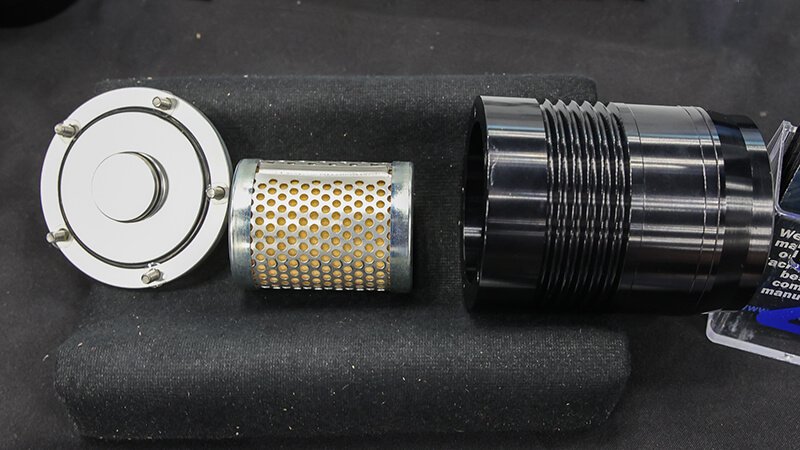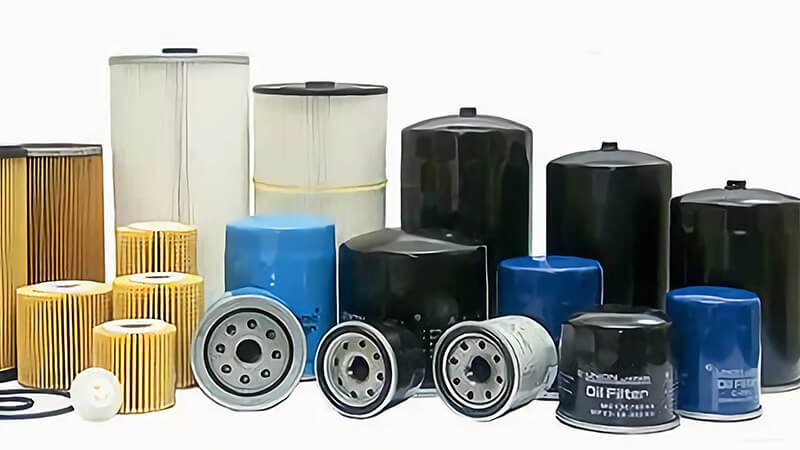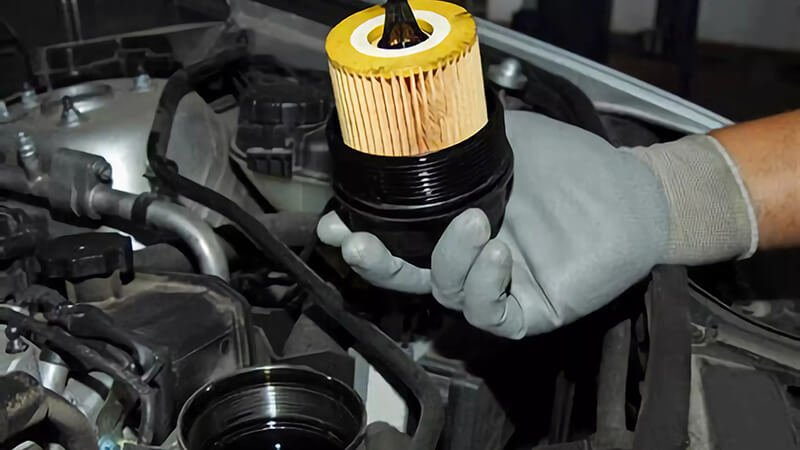Understanding car parts can be overwhelming, but some components are essential for your vehicle’s performance and longevity. The fuel filter is one of these parts. Let’s take a closer look at why it matters and how it impacts your car’s operation.
A fuel filter is a crucial part of your car’s fuel system. It helps remove contaminants and debris from the fuel before it reaches the engine, ensuring smooth performance and protecting vital engine parts.
Now that we’ve covered the basics of a fuel filter, let’s dive deeper into its role in your vehicle and explore what could happen if you neglect its maintenance.

What is the fuel filter?
At first glance, a fuel filter1 might seem like just another small part of your car. But it plays an incredibly important role in protecting your engine from harmful debris that could cause serious damage.
The fuel filter is a crucial component of your car’s fuel system2, filtering dirt, rust, and other contaminants from the fuel before it reaches the engine. Without a properly functioning fuel filter, these particles could damage your engine and other key parts of the fuel system.
The fuel filter is an essential part of your car's fuel system, designed to protect the engine and ensure smooth fuel flow. It serves a critical function by trapping impurities, such as dirt, debris, and rust, that can enter the fuel system from various sources, like the fuel tank3 or storage containers. These contaminants, if not filtered out, can damage vital engine parts, including the injectors, fuel pump, and combustion chamber.
How Fuel Filters Work
Fuel filters are typically made of porous material, such as synthetic fabric or metal mesh, that allows fuel to pass through while catching contaminants. The filter is designed to work under high pressure, as fuel systems need to maintain a steady flow of fuel to the engine. The filter ensures that only clean fuel is delivered to the engine, which is necessary for optimal performance.
| Type of Contaminant | Source | Impact on Engine |
|---|---|---|
| Dirt | Fuel storage | Clogs fuel injectors, reduces efficiency |
| Rust | Fuel tank | Damages engine parts, causes corrosion |
| Debris | Fuel delivery | Clogs fuel filter, leads to performance issues |
The lifespan of a fuel filter varies depending on driving conditions, fuel quality, and filter type. Over time, the filter becomes clogged with contaminants and loses its ability to do its job effectively. This is why it is important to replace your fuel filter regularly.
Without a properly functioning fuel filter, the engine will not get the clean fuel it needs. This can lead to rough idling, poor acceleration, and engine misfires. In severe cases, contaminated fuel can damage internal components, requiring costly repairs.

What happens if you don't run a fuel filter4?
It might seem like a small part, but neglecting to replace or run a fuel filter can lead to big problems for your car. Let’s explore what could happen if you skip this crucial maintenance.
If you neglect your fuel filter, contaminants could flow into the engine, causing clogged injectors5, reduced fuel efficiency, and potentially leading to severe engine damage. Regular replacement is essential for optimal vehicle performance.
If you neglect to replace your fuel filter or fail to run one at all, the consequences can be significant and expensive. The most common issue that arises is that contaminants from the fuel, such as dirt, rust, and debris, are allowed to enter the engine. These particles can clog the fuel injectors, which are responsible for delivering fuel into the engine at the proper pressure. This blockage can reduce the efficiency of the injectors and cause uneven fuel distribution, leading to poor engine performance.
Effects of Neglecting the Fuel Filter
| Consequence | Description |
|---|---|
| Clogged Injectors | Contaminants obstruct fuel injectors, resulting in poor fuel delivery, misfires, and poor acceleration. |
| Fuel Pump Damage | With a clogged filter, the fuel pump has to work harder to push fuel through, leading to overheating and potential failure. |
| Poor Fuel Economy | When the fuel injectors aren’t working properly, the engine becomes less efficient, consuming more fuel for the same distance. |
| Engine Misfires & Stalling | When contaminants reach the combustion chamber, they can cause engine misfires, rough idling, and stalling. |
If the fuel filter becomes too clogged, it can reduce the flow of fuel to the engine, resulting in poor acceleration and rough idling. Over time, this can lead to increased fuel consumption, higher emissions, and an overall reduction in the car's performance.
In the worst case, neglecting the fuel filter can lead to complete engine failure. For instance, if the debris enters the fuel injectors or combustion chamber, it can cause significant damage to these components, leading to expensive repairs or even the need for a new engine. Therefore, replacing the fuel filter at regular intervals is a cost-effective way to avoid these issues.

What is the difference between a fuel filter6 and an oil filter7?
Both fuel and oil filters play important roles in keeping your car running smoothly. But are they the same? Let’s take a closer look at the differences between these two filters.
The fuel filter and the oil filter serve different purposes. While the fuel filter cleans fuel before it reaches the engine, the oil filter removes contaminants from the engine oil, ensuring proper lubrication of engine components.
Fuel filters and oil filters are both crucial components of your car’s engine system8, but they serve entirely different functions. The fuel filter’s role is to ensure that the fuel entering the engine is clean and free from debris. This is important because any contaminants in the fuel can damage the engine and other components of the fuel system.
On the other hand, the oil filter’s role is to clean the oil that circulates throughout the engine. Engine oil lubricates and cools the moving parts of the engine, and it picks up contaminants over time, such as carbon particles, metal shavings, and dirt. The oil filter ensures that these contaminants are removed from the oil, keeping the engine running smoothly.
Fuel Filter vs. Oil Filter
| Feature | Fuel Filter | Oil Filter |
|---|---|---|
| Primary Purpose | Filters fuel before it reaches the engine | Filters oil to keep the engine parts clean |
| Common Contaminants | Dirt, rust, debris in fuel | Carbon particles, metal shavings, dirt |
| Location | Between the fuel tank and engine | On the engine oil system |
| Replacement Frequency | Every 30,000-40,000 miles | Every oil change (every 3,000-5,000 miles) |
| Impact of Neglect | Poor engine performance, stalling | Poor lubrication, engine wear |
While both filters are necessary for the health of your engine, they have distinct roles. The fuel filter ensures that only clean fuel enters the engine, preventing any blockages or damage to injectors and the combustion chamber. The oil filter, on the other hand, maintains the cleanliness of the engine oil, ensuring that the moving parts of the engine are properly lubricated and protected from wear and tear.
Both filters must be replaced regularly to ensure the longevity and performance of your vehicle. Skipping maintenance on either filter can lead to costly engine damage. That’s why it’s essential to replace both the fuel and oil filters according to the recommended schedule.

Is a fuel filter9 an easy fix?
If you’ve noticed performance issues with your vehicle, you might be wondering whether replacing the fuel filter is something you can do yourself. Let’s find out how easy or difficult this fix really is.
Replacing a fuel filter10 is not overly complicated, but it does require some technical knowledge and the right tools. If you're not comfortable working with your car's fuel system11, it's best to leave it to a professional mechanic.
Replacing a fuel filter isn’t an impossible task, but it requires some understanding of your vehicle’s fuel system. If you’re considering doing it yourself, here’s what you need to know:
Steps to Replace a Fuel Filter
- Relieve the Fuel System Pressure: Before doing anything, it's crucial to relieve the pressure in the fuel system to avoid fuel leakage. This can usually be done by removing the fuse for the fuel pump and starting the engine until it stalls.
- Locate the Fuel Filter: The filter is typically located along the fuel line, either near the fuel tank or close to the engine. Consult your vehicle’s manual for the exact location.
- Disconnect the Fuel Lines: Use special tools to disconnect the fuel lines from the filter. Be prepared for some fuel spillage.
- Remove and Replace the Filter: Use the appropriate tools to remove the old filter, and then install the new filter, ensuring it’s securely attached.
- Reassemble and Test: Once the filter is replaced, reconnect the fuel lines, replace the fuse for the fuel pump, and test the car to ensure everything is working correctly.
While it is not a difficult job, it can be messy and potentially hazardous. Fuel systems can be under high pressure, and improper handling could lead to fuel leaks, which are dangerous. If you lack experience or the proper tools, it might be safer to have a professional mechanic handle the replacement.
Here’s a quick comparison of DIY vs. professional replacement:
| Factor | DIY Replacement | Professional Replacement |
|---|---|---|
| Time Required | 1-2 hours | 30-60 minutes |
| Skill Level | Moderate | High |
| Cost | Low (cost of parts only) | High (labor + parts) |
| Risk | Medium (potential for errors) | Low (expert handling) |
In conclusion, replacing a fuel filter is doable for experienced DIYers but may be better left to professionals if you’re unsure. The most important thing is not to delay the replacement. Neglecting this maintenance can result in long-term damage to your engine and fuel system.

Conclusion
Fuel filters are a crucial component of your car’s fuel system. They protect the engine from harmful debris and contaminants that could otherwise cause serious damage. Regular maintenance, including fuel filter replacement, is key to ensuring your vehicle runs efficiently and smoothly. Neglecting this task can lead to costly repairs, so it’s worth investing time in understanding the role of the fuel filter and replacing it when necessary.
-
Understand the role of the fuel filter in protecting the engine from contaminants. ↩
-
Discover the different parts of a fuel system and their functions. ↩
-
Find out how a fuel tank contributes to the overall fuel system performance. ↩
-
Learn about the negative effects of neglecting or skipping the fuel filter. ↩
-
Discover how clogged injectors can lead to poor engine performance and costly repairs. ↩
-
Understand the function of the fuel filter in protecting the engine from harmful debris. ↩
-
Learn how oil filters ensure proper lubrication and prevent engine damage. ↩
-
Explore the critical parts of the engine system and how they work together. ↩
-
Find a detailed guide on how to replace the fuel filter and the necessary steps. ↩
-
Learn about the tools required to replace a fuel filter safely and efficiently. ↩
-
Discover how the fuel system works and its key components. ↩













